Ukrainian refugees in a Romanian gymnasium used as a shelter © Edm
More than 75 years of peace on the European continent (briefly interrupted by the 1990s war in the Balkans), have brought prosperity and stability to a continent which has been the cradle of world civilization, but which was also brought to its knees by two World Wars that reduced it to ashes. Europeans can never forget the horrors that their ancestors have gone through. That is perhaps why, when war in Ukraine started, many were stunned and frightened. Most of us have lived only in peaceful times and never imagined that such horrible destructive actions, of such magnitude, would ever be possible again on European soil. And yet, it is happening, here, close to us. Ruins, bombs, civilian casualties, tension and terror are next door.
One cannot help but be impressed; one cannot help but cry one’s heart out for this drama of modern times, that has the potential to affect the entire continent. And after the huge wave of Syrian refugees in 2015, when Europe welcomed millions fleeing war in the Middle East , we are now facing an even bigger challenge. It was initially estimated by the UNHCR that between 4 and 7 million Ukrainians might flee from their country, ravaged by the Russian assault.

Only one week after the start of the war, over 1 million people (mostly women and children) had fled Ukraine through the neighbouringr countries of Poland, Romania, Moldova, Slovakia and Hungary. The refugees are coming every minute, every hour, by car, train and even by foot in what is already considered the worst humanitarian crisis since the end of WWII. Nobody knows how long this will last and what the future holds for us all, but what we do know for sure is that we must show solidarity, and help our European friends. ‘We have to prepare for millions’ said Ylva Johansson, the EU Home and Affairs Commissioner. Normally Ukrainians may enter visa-free into the EU and stay for up to 90 days. But if things get worse in their country, these people will probably have to stay longer, perhaps permanently. For the first time in its history, the European Union will use a ‘temporary mass protection’ law (which is in place since 2015 but was never used before), allowing refugees to extend their stay in the Union. The European Union will grant work and stay permits for all Ukrainian refugees for up to 3 years. There are already voices saying that a refugee distribution mechanism should be instated. “ The EU needs a resettlement mechanism to get the wounded, women and children out of Ukraine” argued Agne Bilotaite, Lithuania’s Interior Minister.
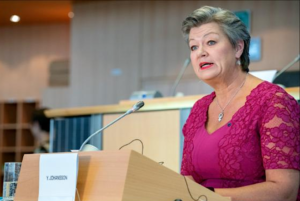
Filippo Grandi, the UN High Commissioner for Refugees said : “the humanitarian consequences on civilian population will be devastating. There are no winners in war, but countless lives will be torn apart”. The UNHCR has mobilized to help displaced Ukrainians. It has a strong presence in the region, coordinating the refugee response together with other UN agencies, local authorities and NGOs. The UNHCR declared that they are sending staff, resources and relief items “while preparing to provide also cash assistance via cards as needed”.
Because martial law was declared in Ukraine, preventing men aged 18 to 60 to leave the country, most refugees are now women and children, the most vulnerable populations. There are also 2 million people with disabilities and around 800.000 in orphanages who need help across Ukraine.
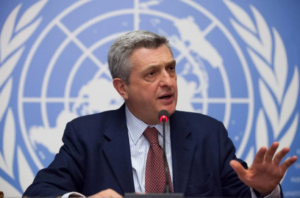
In the first 15 hours, Poland had already welcomed around 45.000 refugees. The traditional ties between the two countries and its proximity to Germany, where many Ukrainians have relatives, made Poland a prime destination for the refugees. Romania, the Republic of Moldova, Slovakia and even Hungary, with its well-known “no-migrants’ policy, welcomed desperate people fleeing the war in Ukraine.
I have heard critical voices saying that the same tragedies occurred in Syria, Afghanistan or Yemen and that these did not inspire the same amount of compassion from Europeans. I can certainly say that this is not true. I was personally involved in many charity actions to help refugees, 6 or 7 years ago. People showed compassion and also made donations at the time. Human suffering is equally upsetting wherever it happens on the planet, and all lives have the same value. But I also think that it is part of human nature to be powerfully affected when things happen so close to you, to your own neighbors, when you can see with your own eyes the desperation of those who have lost everything overnight. A good friend of mine from Bosnia wrote to me in the first days of the military conflict saying that the images she saw from Ukraine brought back sad memories from her own childhood and the Bosnian war. They triggered deeply buried feelings of fear and uncertainty. So, the trauma of war never really and completely leaves those who have experienced it.
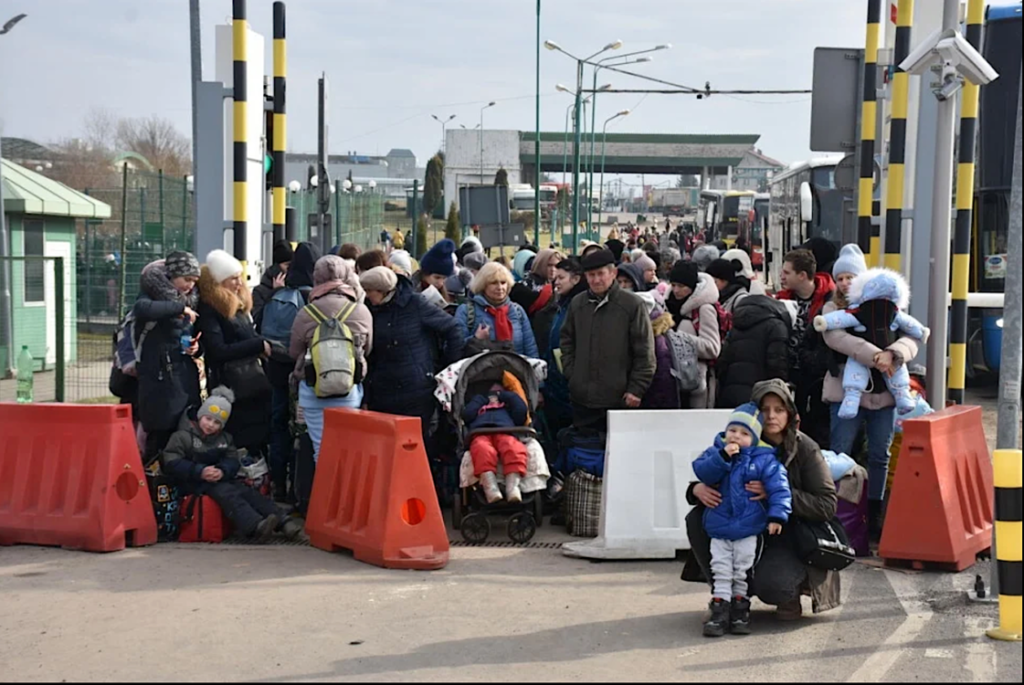
This is not a time for useless polemics and ‘politically correct’ declarations; it is a time for action and solidarity between Europeans and the world. That solidarity is now being demonstrated daily by all of Ukraine’s neighboring countries.
Romania has a 613, 8 km border with Ukraine, and Romanian-speaking people traditionally formed a large minority in the country. My own grandmother was born in Bolgrad, a small city near Odessa, in southern Ukraine. So, when the refugee wave started, many chose to come to Romania, through its border points at Siret, Halmeu, Sighetul Marmatiei and Isaccea. Many are arriving to Romania also through Moldova. While at the beginning, most of the incoming refugees were just transiting Romania on their way to Western countries where they had relatives, now more and more are deciding to stay. Many have no ‘plan B’, no money, no family or friends to go to and, what is more tragic, no idea when or if they will ever be able to go back to their own homes in Ukraine. Many are sending away just their children; they help them cross the borders where relatives or friends are waiting, and then return to fight for their country. Doctors, teachers, farmers… they all had a life before. And now, in just the blink of an eye, it’s all gone, and all they have left is defending their homeland.
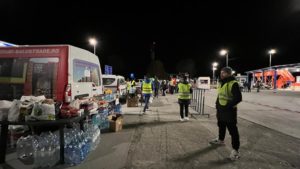
Long waiting hours have been registered at all borders. People even stay for days until they can finally cross the border to Romania. These are all people desperately trying to escape death and destruction. They arrive, horrified and exhausted; one can see that in their eyes, although many try to put on a brave face for the sake of their children. But when one travels by foot for miles (many abandoning their cars and walking to the borders, because of long queues and blocked roads) with one’s children in one hand and a small piece of luggage in the other, there is great cause for desperation. Many have even taken their pets with them. The National Sanitary Veterinary and Food Safety Authority (ANSVSA) has granted a temporary derogation, in order to allow people entering the country with their beloved animals.
Romania has mobilized as never before. More than 40 years of communism showed us where the danger comes from and in a country that was left behind the Iron Curtain for decades and had to endure the oppression and influence of the Soviet Union, the feelings and the will to help those fleeing the Russian aggression are even stronger.
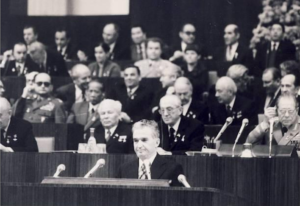
Thousands of people, NGOs, churches, private businesses, together with the state Department for Emergency Situations, mobilized in the first hours of this conflict and anticipated what was to come, as well as the great need for help and organization at the borders. A special decision of the National Committee for Emergency on 25 February, allowed anyone coming from Ukraine to enter the country, even if they had no valid PCR Covid test. Quarantine was no longer required either.
The images of the very first days were simply impressive and have been reported by journalists from all over the world. People rushed to help, in an impressive gesture of human solidarity. Some offered free accommodation, transport to other cities, legal assistance, translation, food, warm gloves and scarves or just a hot cup of tea or soup. Children were given small toys in order to bring a little smile on their worried faces.
Rows of stalls with water bottles, food, clothes, blankets or diapers are to be seen in the proximity of all the Romanian border crossings to Ukraine. Locals from small villages right next to the crossing points, have rarely seen so many people assembled there. Everyone is in a hurry to do their own part, small contributions which mean the world to the people in need.
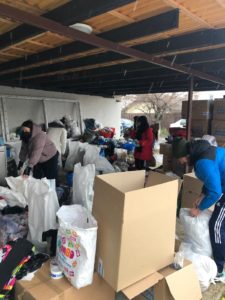
Trains carrying refugees are also arriving all over Romania. Train stations have become impromptu refugee centers. Many hotels or tourist pensions opened their doors to the Ukrainians for free. The authorities are managing the reception and triage of the newly arrived, in large tents, right at the border. At Siret, currently the busiest border crossing point in Romania, people are greeted warmly. There is a mobile camp set up nearby, where a team of volunteer psychologists offer free counseling.
The refugees are then taken to accommodation facilities or transported to the airports, if they want to travel further. There are also other nationalities trapped in Ukraine. Over 1000 foreign students have fled Ukraine so far and entered Romania, from where they were extracted by their own countries. People from India, Ghana, Nigeria or Tunisia escaped Ukraine through Romania recently. Also, Romania welcomed over a 1000 Ukrainian orphans. Arrangements have been made for some of them to be adopted.
Ukrainian refugees are coming at a very rapid rate; over 20.000 people per day are crossing the Romanian borders, and quick solutions have to be found for all of them. They are either asylum seekers, temporary refugees or just transiting the country, but they all need support of some kind.
Ioana Moldovan, a talented Romanian photographer and freelance journalist, travelled to the Siret and Isaccea borders and shared touching photos and stories of the people fleeing the war. (https://instagram.com/ioanacmoldovan). She told me that each day, things are getting more and more organized at the borders as authorities and volunteers work together. At Isaccea where people cross the Danube by ferry from Ukraine, she said that there are now also volunteers from Bulgaria and Moldova. Some Ukrainian refugees even decided to stay and help, especially with translation for people who do not speak other languages.
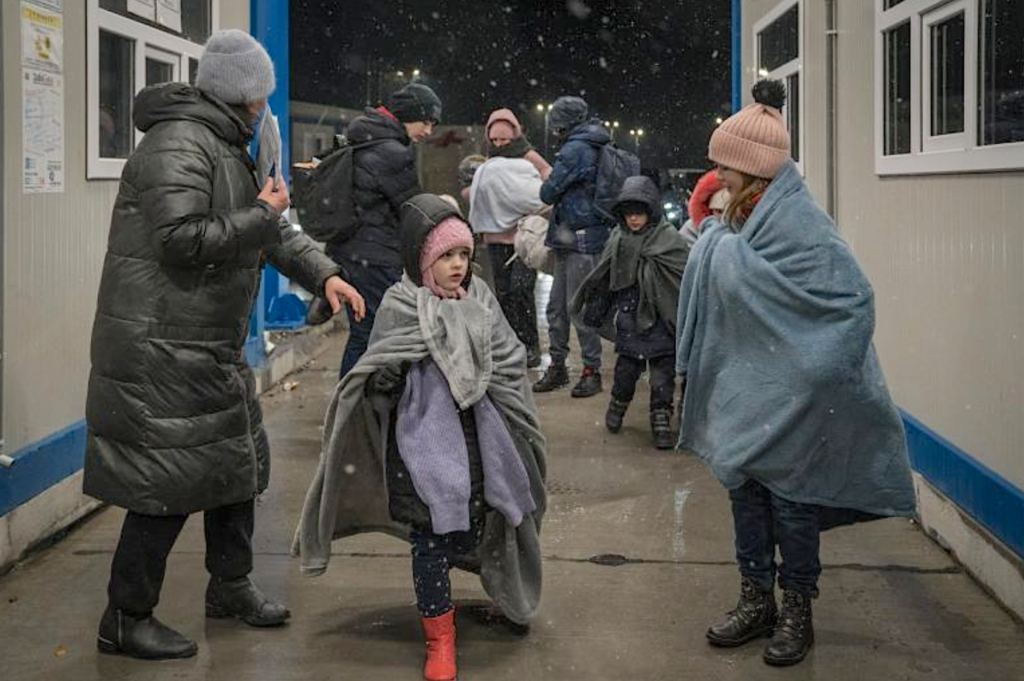
The Romanian Government has currently a special section on its official website dedicated to the crisis. Entitled ‘Ukraine-Together we help more’, it offers precious information about access to Romania for Ukrainian citizens, and steps they need to follow if they seek asylum. There is also information in Romanian, English and Ukrainian about medical services and the right to work in Romania.(www.gov.ro). A special 119 telephone number has been set up to treat emergencies related to children (including children without families).
A special platform dedicated to Ukrainian refugees https://refugees.ro/ , has been created with the aim of ‘streamlining the support and resources offered by Romanian citizens’. It is a completely private initiative, inspired from an idea by Alexandru Panait, a successful, young Romanian entrepreneur who has recently been involved in supporting the accelerated digitalization of the Romanian administration, launched a crypto-currency and developed the first block-chain technology in Romania. There is also ‘E-primariata’, the first app intended to help Romanian citizens in dealing with the bureaucracy in state institutions. He was selected as part of the European ‘Next Generation Internet’ (NGI), which is to set the digital infrastructure of the future Digital European Union. Alexandru Panait told me that the idea for the refugee.ro website came to him after seeing the Facebook support Group ‘Uniti pentru Ucraina’ (meaning ‘United for Ukraine’), which gathered more than 200.000 members in its first days.

The Moldovan and Romanian Governments, supported by the UN Refugee Agency, UNHCR and the International Organization for Migration, IOM have set in place the transfer of people who fled Ukraine, including third country nationals, from southern Moldova to Romania, a journey of some 230 kilometres. The first convoy departed Palanca Border Crossing Point on March 11th, transporting 250 refugees to Huși in Romania © Romania.iom
He quickly understood that all the offers for help needed to be channeled and so, in just 4 hours, he set up a platform where offers and demand were organised. They now have a call center with a chatbot which is an interactive agent, and they plan to expand the operation in Europe, and receive offers for help from all over the continent. He, like many Romanians, including myself, cannot remain impassive in the face of suffering. We understand only too well what Ukrainians are going through now, and we remember from our own history, what it means to be deprived of freedom; we won ours through a bloody revolution in 1989.
Another support platform, www.dopomoha.ro , available in Romanian, Ukrainian, English and Russian, is a project initiated and developed by ‘Code for Romania’, in partnership with the Department for Emergency Situations (ISU), the UN Refugee Agency, International Organization for Migration (OIM) and the National Romanian Council for Refugees. They have a help line in Ukrainian language where people fleeing the Ukrainian war can find all relevant, reliable and official information about seeking protection in Romania.
‘Red Cross’, one of the oldest Romanian humanitarian organisations, has been one of the most active. They have provided support with food supplies, necessity goods and phone cards, at the borders but also inside Ukraine. In March, the largest Romanian humanitarian live concert was organized in cooperation with PRO TV, one of the most popular TV stations in the country, in the National Stadium in Bucharest. All proceeds went to help Ukrainian refugees.
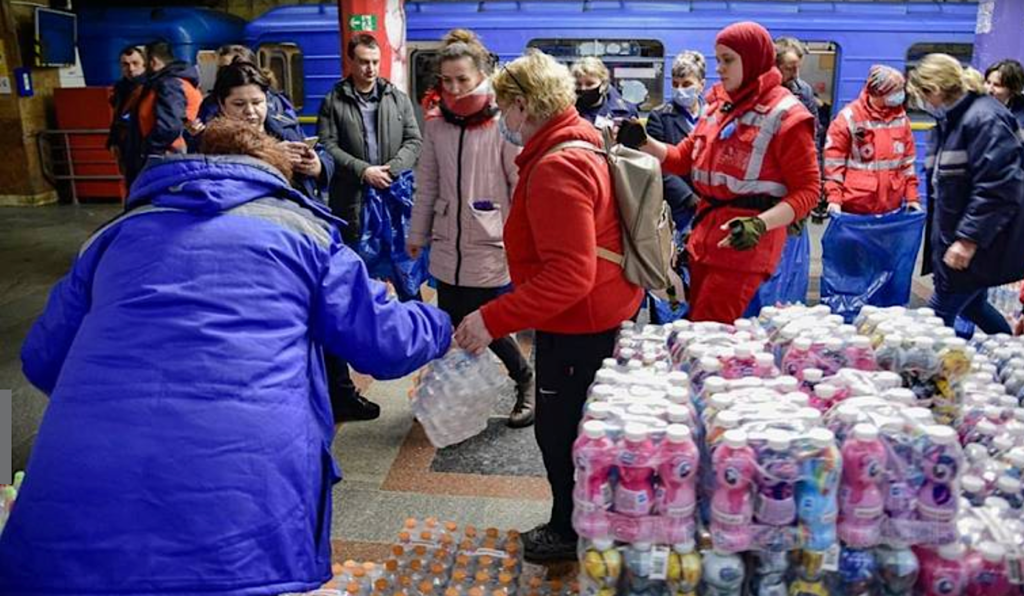
‘Save the Children’ Romania is actively helping Ukrainian refugee children. Stefan Mandachi, a businessman in Suceava, has transformed his hotel into a refugee center, offering free accommodation. The other day I heard about a real estate developer who offered 8 newly built villas in Corbeanca, near the capital Bucharest, to families in need. Also, one of the fanciest wedding venues near Bucharest, Padurile Regale, has opened its luxurious ballrooms to refugees. It is currently hosting foreign students waiting for flights to their home countries.
The National Theater in Bucharest has offered its bus for transporting refugees from the borders. Many other transport companies have also offered free transport for refugees.
Radisson Hotel in Bucharest offered 10 rooms free of charge, and Romanian universities all over the country provided dormitory spaces. The Sport Ministry opened its training facilities as temporary shelters. Everywhere, people are mobilizing to help. The website www.romanianunitedfund.org can be used for donations sent even by Romanians living abroad.
Corina Dima, a Romanian blogger, posted on her website, www.de-corina.ro , a complete list of restaurants in Bucharest that offer free meals upon presentation of an Ukrainian ID.
Adi Hadean, one of the most popular Romanian chefs is collaborating with World Central Kitchen, and together with his own team of volunteers (he has his own volunteer project ,‘Solidar Social’) offers daily, warm, free meals at the Sighet border point, just a few meters away from the crossing point (https://activsocial.adihadean.ro/).
ARBO media announced that its 35 local newspapers, 80 radio stations and 45 TV stations offer free media coverage for people offering their help to Ukrainian refugees. (www.arbomedia.ro).
Donorium, a Romanian blood donation platform, is encouraging Romanians to donate blood and help the wounded in Ukraine. The Romanian government also announced the donation of 11 fully-equipped ambulances to Ukraine.
BCR, one of the largest Romanian private banks, together with the ‘Jobful Playground’ start-up, initiated the ‘jobs4ukr’ platform ( https://jobs4ukr.com/ ), which helps Ukrainian refugees to find jobs in Romania and abroad.

I talked to Maximilien Caradja Johnson, the president of one NGO which has been collecting and distributing donations. Member of an old, aristocratic Romanian family and a successful businessman, he launched his foundation in 2022 in memory of his grandmother, Ecaterina Caradja, who had taken care of an orphanage of 3000 children before the communists came to Romania and took everything away. While the NGO was initially seeking to protect Romanian cultural heritage, the current situation compelled him to act quickly. In just one day, impressive amounts of donations were collected, sorted and transported to the borders and also inside Ukraine, to help people wanting to enter Romania and who had been waiting for days. Together with his team of 40 volunteers, they have so far collected more than 1.000.000 Euros worth of necessity goods. They are also cooperating with Uber for free transport of donated materials.
On 1 March, Romanian president, Klaus Iohannis announced that Romania is creating a regional hub to collect and transport international humanitarian aid to Ukraine.
Similar efforts are reported from all the countries around Ukraine. Everyone is doing their part to help, but now it seems that politicians and diplomats need to act together and stop this war spreading even further. War is no good to anyone.
‘We share the same biology,
Regardless of ideology,
Believe me when I say to you,
I hope the Russians love their children too’
(Sting, ‘Russians’ song)

